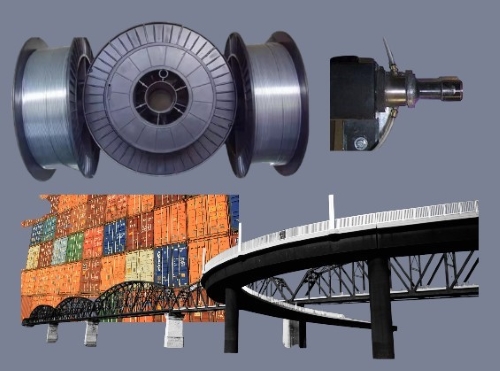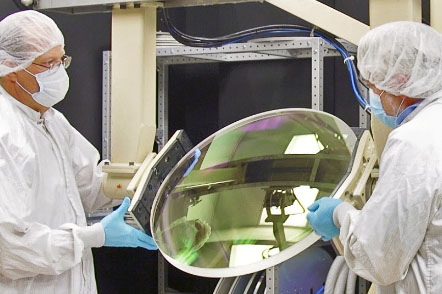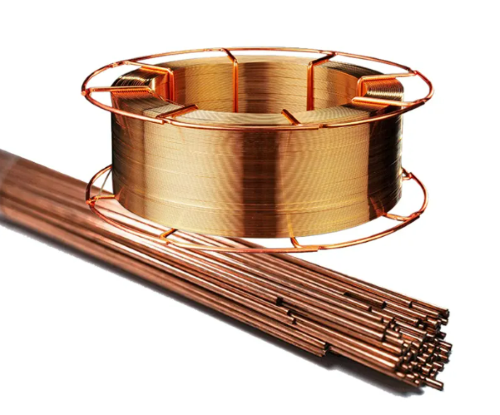Zinc-Aluminium Alloy Wire for Anti-Corrosion Applications
Introduction
Zinc-aluminium (Zn-Al) alloy wire is a highly versatile material renowned for its exceptional anti-corrosion properties. This makes it an indispensable choice for thermal spraying in various industrial applications. Combining the benefits of zinc and aluminium, this alloy offers excellent performance in terms of corrosion resistance, mechanical strength, and thermal stability.
In this article, we will discuss the composition, properties, manufacturing processes, and key applications of zinc-aluminium alloy wire, particularly focusing on its role in thermal spraying for anti-corrosion purposes.

Composition and Properties
Zinc-aluminium alloys typically consist of zinc as the base metal, with aluminium content ranging from 5% to 55%. The specific composition can be tailored to meet the requirements of different applications. Common grades include Zn-5Al, Zn-10Al, and Zn-22Al.
The addition of aluminium to zinc significantly enhances the alloy's properties, providing a balance between strength, ductility, and corrosion resistance.
Key properties of zinc-aluminium alloy wire include:
- Corrosion Resistance: Aluminium's presence in the alloy forms a protective oxide layer on the surface, significantly enhancing corrosion resistance. This makes Zn-Al wire particularly suitable for harsh environments and outdoor applications.
- Mechanical Strength: The alloy exhibits good tensile strength and hardness, making it capable of withstanding mechanical stress and deformation. This property is crucial for applications requiring durability.
- Thermal Conductivity: Zinc-aluminium alloys possess good thermal conductivity, allowing efficient heat dissipation. This is beneficial in applications such as electrical components and heat exchangers.
- Electrical Conductivity: Although not as high as pure copper or aluminium, Zn-Al alloys still offer adequate electrical conductivity for certain applications.
- Workability: The alloy wire can be easily drawn, rolled, and formed into various shapes and sizes, facilitating its use in diverse manufacturing processes.
Manufacturing Processes
The production of zinc-aluminium alloy wire involves several key steps:
- Melting and Alloying: The primary metals, zinc and aluminium, are melted together in precise proportions to create the desired alloy composition. The melting process must be carefully controlled to ensure uniformity and prevent contamination.
- Casting: Once the alloy is melted, it is cast into billets or rods, which serve as the raw material for wire production. Continuous casting methods are often used to produce high-quality billets with consistent properties.
- Hot Rolling: The billets are then hot-rolled to reduce their cross-sectional area and improve their mechanical properties. This process involves heating the billets to a specific temperature and passing them through a series of rolling mills.
- Drawing: The rolled billets are further processed through drawing, where the material is pulled through a series of dies to achieve the desired wire diameter. Drawing not only reduces the diameter but also improves the wire's tensile strength and surface finish.
- Annealing: Depending on the intended application, the wire may undergo annealing, a heat treatment process that relieves internal stresses and enhances ductility. Annealing can be performed at various stages of the manufacturing process to achieve specific material properties.
- Coating and Finishing: To further enhance corrosion resistance and improve surface quality, the wire may be coated with protective layers such as zinc or other suitable coatings. This step ensures the wire's longevity and performance in demanding environments.
Key Applications in Anti-Corrosion
Zinc-aluminium alloy wire is widely applied to thermal spraying anti-corrosion in various sectors:
1. Thermal Spraying for Anti-Corrosion:
One of the primary applications of Zn-Al wire is in thermal spraying, a process where the wire is melted and sprayed onto surfaces to form a protective coating. This method is extensively used in industries like marine, oil and gas, and infrastructure, where components are exposed to harsh environmental conditions. The Zn-Al coating provides a robust barrier against corrosion, extending the lifespan of the coated materials.
2. Containers and Storage Tanks:
The interior and exterior surfaces of containers and storage tanks are often coated with Zn-Al alloy to protect against corrosion caused by exposure to various chemicals and environmental factors. This application is critical in industries such as petrochemical, food processing, and water treatment, where the integrity of storage vessels is paramount.
3. Bridges and Head Frames:
Infrastructure such as bridges and head frames is exposed to harsh weather conditions and require robust anti-corrosion protection. Zn-Al thermal spray coatings provide a durable solution that ensures structural integrity over time. This application is particularly significant in coastal and industrial areas, where structures are prone to aggressive corrosion.
4. Electric Iron Towers, Poles, and Towers:
Electrical infrastructure, including iron towers and poles, benefits from the corrosion-resistant properties of Zn-Al alloy coatings. This ensures reliable performance and reduces maintenance costs. The protective coating also enhances the safety and longevity of power transmission and distribution networks.
5. Capacitors and Metal Brackets:
In the electronics industry, Zn-Al wire is used for coating capacitors and metal brackets, providing a protective layer that prevents corrosion and improves the longevity of components. This application is essential in ensuring the reliability and performance of electronic devices and systems.
6. Nodular Cast Iron Pipes:
These pipes are commonly used in water distribution and sewage systems. Coating them with Zn-Al alloy protects against corrosion from water and sewage, ensuring the long-term functionality of the piping systems. This application is vital for maintaining the infrastructure of urban water supply and waste management.
7. Traffic Equipment:
Traffic equipment, including signposts, barriers, and railings, are often exposed to the elements. Coating these with Zn-Al alloy provides long-lasting protection against rust and corrosion. This not only enhances the durability of traffic equipment but also contributes to public safety by ensuring the structural integrity of traffic control devices.
Conclusion
The unique combination of corrosion resistance, mechanical strength, and workability makes zinc-aluminium alloy wire an indispensable material for modern manufacturing and construction. The use of Zn-Al wire in thermal spraying for anti-corrosion purposes is particularly noteworthy. As technology and industries continue to advance, the demand for high-performance materials like zinc-aluminium alloy wire is expected to grow.
Stanford Advanced Materials (SAM) is a reliable supplier. We now provide various zinc products, including a wide range of zinc-aluminium alloy wire in different compositions and sizes at competitive prices. Customized products are also available to meet specific industrial needs. Send us an inquiry if you are interested.



